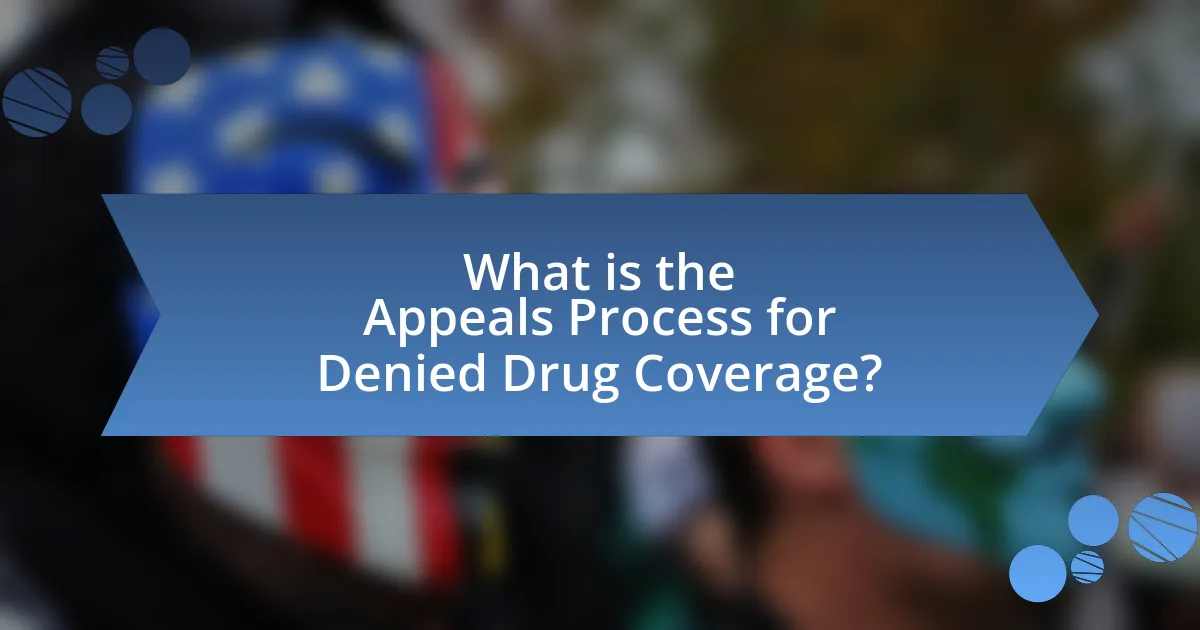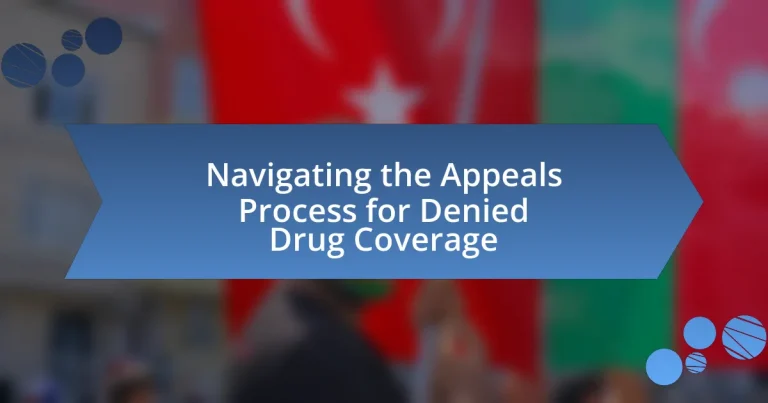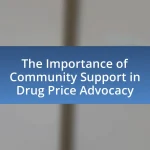The article focuses on the appeals process for denied drug coverage, detailing the steps individuals can take to contest such denials. It outlines the importance of reviewing denial letters, gathering necessary documentation, and submitting formal appeals to insurance providers. Key stakeholders involved in the process, common reasons for denial, and potential outcomes of appeals are discussed. Additionally, the article provides strategies for improving the chances of a successful appeal, resources for assistance, and best practices for navigating the appeals process effectively.

What is the Appeals Process for Denied Drug Coverage?
The appeals process for denied drug coverage typically involves several steps that allow individuals to contest the denial. Initially, the individual must review the denial letter to understand the reasons for the denial and gather necessary documentation, such as medical records or prescription information. Next, the individual submits a formal appeal to the insurance provider, often using a specific form or format outlined in the denial letter. This appeal should include a detailed explanation of why the coverage should be granted, supported by relevant evidence.
After the appeal is submitted, the insurance company is required to review the case and respond within a specified timeframe, usually within 30 days for standard appeals. If the appeal is denied again, the individual may request an external review by an independent third party, which is mandated by the Affordable Care Act for certain types of coverage disputes. This external review provides an additional layer of scrutiny and can result in a binding decision on the insurance provider.
How does the appeals process work in the context of denied drug coverage?
The appeals process for denied drug coverage involves several steps that allow individuals to contest the denial. Initially, the individual must review the denial letter to understand the reasons for the denial, which typically includes specific codes and explanations. Following this, the individual can submit a formal appeal to the insurance company, often requiring the completion of a specific form and the inclusion of supporting documentation, such as medical records or a letter from a healthcare provider justifying the need for the medication.
Once the appeal is submitted, the insurance company is obligated to review the case and respond within a designated timeframe, usually within 30 days for standard appeals. If the appeal is denied again, the individual may request an external review by an independent third party, which is mandated under the Affordable Care Act for certain plans. This external review provides an additional layer of scrutiny and can result in a decision that may overturn the insurer’s denial.
The process is governed by regulations that require insurers to provide clear information on how to appeal and the timelines involved, ensuring that individuals have a structured pathway to contest denied drug coverage.
What are the key steps involved in the appeals process?
The key steps involved in the appeals process for denied drug coverage include reviewing the denial letter, gathering supporting documentation, submitting a formal appeal, and following up on the appeal status. Initially, the individual must carefully examine the denial letter to understand the reasons for the denial, which often includes specific codes or criteria used by the insurer. Next, the individual should collect relevant medical records, prescriptions, and any other documentation that supports the necessity of the drug. After compiling this information, the individual submits a formal appeal to the insurance company, adhering to any specified timelines and procedures outlined in the denial letter. Finally, it is crucial to follow up with the insurer to ensure the appeal is being processed and to address any additional requests for information. These steps are essential to effectively navigate the appeals process and increase the chances of a successful outcome.
Who are the stakeholders in the appeals process?
The stakeholders in the appeals process for denied drug coverage include the patient, the healthcare provider, the insurance company, and the pharmacy. The patient initiates the appeal by contesting the denial, while the healthcare provider may support the appeal by providing necessary medical documentation. The insurance company reviews the appeal and makes a determination based on policy guidelines. The pharmacy may also be involved in facilitating the process by providing information about the prescribed medication. Each stakeholder plays a critical role in ensuring that the appeals process is navigated effectively, contributing to the overall outcome of the appeal.
Why might drug coverage be denied?
Drug coverage may be denied due to several reasons, including lack of medical necessity, the drug not being on the formulary, or failure to meet prior authorization requirements. Insurance providers often require evidence that a medication is essential for the patient’s condition, and if this is not demonstrated, coverage can be rejected. Additionally, if the prescribed medication is not included in the insurer’s list of covered drugs, or if the patient has not completed the necessary steps for prior authorization, the claim may be denied. These criteria are established to manage costs and ensure that prescribed treatments align with approved medical guidelines.
What are common reasons for denial of drug coverage?
Common reasons for denial of drug coverage include lack of medical necessity, non-formulary status, and insufficient documentation. Insurance providers often deny coverage if they determine that the prescribed medication is not essential for the patient’s treatment, which is based on clinical guidelines. Additionally, if a drug is not included in the insurance plan’s formulary, it may be denied coverage. Insufficient documentation, such as missing prior authorization or incomplete medical records, can also lead to denial. These reasons are frequently cited in denial letters and can be addressed during the appeals process.
How do insurance policies influence drug coverage decisions?
Insurance policies significantly influence drug coverage decisions by determining which medications are included in a formulary and the conditions under which they are covered. These policies outline specific criteria for coverage, such as medical necessity, cost-effectiveness, and prior authorization requirements. For instance, a study published in the Journal of Managed Care & Specialty Pharmacy found that insurance plans often restrict access to certain high-cost medications, impacting patient treatment options and adherence. Consequently, the criteria set by insurance policies directly affect the availability and affordability of medications for patients, shaping their overall healthcare experience.
What are the potential outcomes of the appeals process?
The potential outcomes of the appeals process for denied drug coverage include reversal of the denial, upholding the denial, or a negotiated settlement. When the appeals process results in a reversal, the insurance provider may approve the coverage for the denied medication, allowing the patient to access necessary treatment. If the denial is upheld, the patient may need to explore alternative medications or further appeal options. A negotiated settlement may occur when both parties reach an agreement on coverage terms, potentially involving a compromise on medication costs or alternative treatments. These outcomes are critical as they directly impact patient access to necessary medications and overall healthcare costs.
What happens if the appeal is successful?
If the appeal is successful, the insurance company will approve the coverage for the denied drug. This means that the patient will receive the medication at the insurance-covered rate, reducing their out-of-pocket expenses. Successful appeals often result from presenting additional medical evidence or clarifying the necessity of the drug, which aligns with the insurance policy’s coverage criteria.
What are the implications of an unsuccessful appeal?
An unsuccessful appeal in the context of denied drug coverage typically results in the upholding of the initial denial, meaning the patient remains responsible for the cost of the medication. This outcome can lead to financial strain, as patients may have to pay out-of-pocket for necessary treatments. Additionally, an unsuccessful appeal may limit future options for recourse, as some insurance policies restrict the number of appeals allowed or require different grounds for subsequent appeals. Furthermore, patients may experience delays in receiving necessary medications, which can adversely affect their health outcomes.
How can individuals prepare for the appeals process?
Individuals can prepare for the appeals process by gathering all relevant documentation related to their denied drug coverage. This includes the original denial letter, medical records, and any supporting evidence from healthcare providers that justify the need for the medication. Additionally, individuals should familiarize themselves with their insurance policy’s appeals procedure, including deadlines and required forms. Researching similar cases and understanding the criteria used by the insurance company can also strengthen the appeal. According to the National Association of Insurance Commissioners, having a well-organized appeal with clear, factual information increases the likelihood of a successful outcome.
What documentation is necessary for a successful appeal?
A successful appeal for denied drug coverage typically requires specific documentation, including a detailed letter of appeal, medical records, a copy of the denial letter, and any relevant prescription information. The letter of appeal should clearly outline the reasons for the appeal and include supporting evidence from healthcare providers. Medical records must demonstrate the necessity of the prescribed medication, while the denial letter provides context for the appeal. Additionally, including any prior authorization requests or correspondence with the insurance company can strengthen the case.
How can medical records support an appeal?
Medical records can support an appeal by providing documented evidence of a patient’s medical history, diagnoses, and treatments, which can substantiate the necessity of a prescribed medication. These records include clinical notes, test results, and treatment plans that demonstrate the medical rationale for the drug in question. For instance, if a medication is denied due to lack of medical necessity, the records can show prior treatments and their outcomes, reinforcing the need for the specific drug. Additionally, accurate and comprehensive medical records can help clarify any misunderstandings regarding the patient’s condition, thereby strengthening the appeal’s case.
What role do prescription histories play in the appeals process?
Prescription histories serve as critical evidence in the appeals process for denied drug coverage. They provide a documented account of a patient’s medication usage, which can substantiate the medical necessity of the prescribed drugs. By presenting a comprehensive prescription history, patients can demonstrate adherence to treatment protocols and the rationale behind their prescribed medications, thereby strengthening their case for appeal. This documentation is often pivotal in addressing the reasons for denial, as it can clarify the patient’s health needs and the appropriateness of the prescribed therapy.
What strategies can improve the chances of a successful appeal?
To improve the chances of a successful appeal for denied drug coverage, individuals should gather comprehensive documentation, including medical records and letters from healthcare providers that support the necessity of the prescribed medication. This evidence strengthens the case by demonstrating medical need and adherence to treatment protocols. Additionally, reviewing the insurance policy for specific coverage criteria and ensuring that the appeal addresses these criteria can significantly enhance the likelihood of approval. Research indicates that appeals that are well-organized and clearly articulate the reasons for the denial, along with supporting evidence, have a higher success rate, as seen in a study by the National Association of Insurance Commissioners, which found that 60% of appeals with thorough documentation were overturned in favor of the patient.
How can effective communication with insurance providers enhance the appeal?
Effective communication with insurance providers can significantly enhance the appeal process for denied drug coverage by ensuring clarity and understanding of the reasons for denial. When patients articulate their needs and provide comprehensive documentation, such as medical records and treatment history, they can address specific concerns raised by the insurer. Research indicates that clear communication can lead to a higher success rate in appeals; for instance, a study published in the Journal of Managed Care & Specialty Pharmacy found that appeals with detailed supporting information were more likely to be overturned. This demonstrates that effective communication not only clarifies the patient’s position but also aligns it with the insurer’s criteria, thereby increasing the likelihood of a favorable outcome.
What are the best practices for submitting an appeal?
The best practices for submitting an appeal include clearly stating the reason for the appeal, providing supporting documentation, and adhering to the specific guidelines set by the insurance provider. Clearly articulating the grounds for the appeal ensures that the reviewer understands the basis of the request. Supporting documentation, such as medical records or letters from healthcare providers, strengthens the case by providing evidence. Additionally, following the insurance provider’s submission guidelines, including deadlines and required forms, is crucial for ensuring that the appeal is considered. These practices are essential as they increase the likelihood of a successful outcome in the appeals process for denied drug coverage.
What resources are available for navigating the appeals process?
Resources available for navigating the appeals process include official guidelines from health insurance providers, state insurance departments, and advocacy organizations. Health insurance providers typically offer detailed instructions on their websites regarding the appeals process, including necessary forms and timelines. State insurance departments provide consumer assistance programs that can help individuals understand their rights and the appeals process. Advocacy organizations, such as the Patient Advocate Foundation, offer resources and support for patients facing denied drug coverage, including personalized assistance and educational materials. These resources collectively empower individuals to effectively navigate the appeals process and increase their chances of a successful outcome.
How can individuals seek assistance during the appeals process?
Individuals can seek assistance during the appeals process by contacting their insurance provider’s customer service for guidance on the specific steps to take. Insurance companies often have dedicated representatives who can explain the appeals process, provide necessary forms, and clarify deadlines. Additionally, individuals can consult with healthcare professionals, such as pharmacists or doctors, who may offer support in gathering medical documentation to strengthen their case. Advocacy organizations, such as the Patient Advocate Foundation, also provide resources and assistance for navigating appeals related to denied drug coverage, ensuring individuals have access to expert advice and support throughout the process.
What role do advocacy groups play in supporting appeals?
Advocacy groups play a crucial role in supporting appeals for denied drug coverage by providing resources, guidance, and representation to individuals navigating the appeals process. These organizations often offer educational materials that explain the appeals process, assist in gathering necessary documentation, and help individuals understand their rights. For instance, groups like the National Patient Advocate Foundation have been instrumental in advocating for patients’ access to medications and have reported success in overturning denials through strategic appeals. Their involvement can significantly increase the likelihood of a favorable outcome, as they leverage their expertise and experience to navigate complex insurance policies and regulations.
How can legal assistance help in the appeals process?
Legal assistance can significantly enhance the appeals process by providing expert guidance and representation. Attorneys specializing in appeals understand the legal standards and procedural requirements necessary to challenge a denial effectively. They can help gather and present compelling evidence, such as medical records and expert opinions, to support the case. Furthermore, legal professionals can identify and argue relevant legal precedents that may strengthen the appeal, ensuring that all procedural rules are followed to avoid dismissal. Their expertise increases the likelihood of a favorable outcome, as studies indicate that individuals with legal representation are more successful in appeals compared to those without.
What are common pitfalls to avoid during the appeals process?
Common pitfalls to avoid during the appeals process include missing deadlines, failing to provide sufficient documentation, and not understanding the specific reasons for the denial. Missing deadlines can result in automatic dismissal of the appeal, as many insurance companies have strict timelines for submissions. Providing insufficient documentation can weaken the case, as appeals require clear evidence to support the claim. Additionally, not fully understanding the reasons for the denial can lead to ineffective appeals, as the appeal must directly address the issues raised by the insurer. These pitfalls can significantly hinder the chances of a successful appeal for denied drug coverage.
How can individuals stay informed about their rights regarding drug coverage?
Individuals can stay informed about their rights regarding drug coverage by regularly reviewing resources provided by government agencies, such as the Centers for Medicare & Medicaid Services (CMS) and the National Association of Insurance Commissioners (NAIC). These organizations offer comprehensive information on drug coverage rights, including details on appeals processes and consumer protections. Additionally, individuals can consult their health insurance policy documents, which outline specific rights and procedures related to drug coverage. Engaging with local advocacy groups and legal aid organizations can also provide valuable insights and updates on rights related to drug coverage, ensuring individuals are well-informed and able to navigate the appeals process effectively.
What resources provide updates on drug coverage policies?
Government websites, such as the Centers for Medicare & Medicaid Services (CMS) and state Medicaid agencies, provide updates on drug coverage policies. These resources publish official guidelines, policy changes, and updates regarding drug formularies and coverage criteria. For instance, CMS regularly updates its Medicare Part D formulary, which outlines covered drugs and any changes to coverage policies, ensuring that stakeholders have access to the latest information. Additionally, professional organizations like the American Society of Health-System Pharmacists (ASHP) and the National Association of Insurance Commissioners (NAIC) offer insights and updates on drug coverage policies through reports and publications, further supporting stakeholders in navigating the complexities of drug coverage.
How can individuals educate themselves about their insurance plans?
Individuals can educate themselves about their insurance plans by reviewing policy documents, utilizing online resources, and consulting with insurance representatives. Policy documents, such as the summary of benefits and coverage, provide detailed information about coverage limits, exclusions, and costs. Online resources, including government websites like Healthcare.gov and consumer advocacy organizations, offer guides and tools for understanding insurance terms and options. Additionally, speaking directly with insurance representatives can clarify specific questions and provide personalized assistance. These methods ensure individuals have a comprehensive understanding of their insurance plans, which is crucial for navigating processes like appeals for denied drug coverage.
What are the best practices for successfully navigating the appeals process for denied drug coverage?
To successfully navigate the appeals process for denied drug coverage, individuals should gather all relevant documentation, including the denial letter, medical records, and any supporting evidence from healthcare providers. This comprehensive collection of information is crucial as it substantiates the appeal and demonstrates the medical necessity of the prescribed medication.
Next, individuals must carefully review the insurance policy to understand the specific reasons for denial and the criteria for coverage. This knowledge allows for a targeted appeal that addresses the insurer’s concerns directly.
Additionally, crafting a clear and concise appeal letter is essential; it should outline the reasons for the appeal, reference the relevant policy provisions, and include any supporting documentation. Following up with the insurance company after submitting the appeal ensures that it is being processed and allows for addressing any additional questions they may have.
Finally, if the initial appeal is denied, individuals should not hesitate to escalate the matter by requesting an external review, which can provide an independent assessment of the case. This multi-step approach, grounded in thorough preparation and clear communication, significantly increases the likelihood of a successful appeal.


